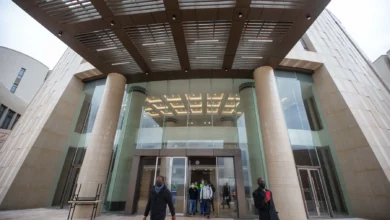Government pays Pomona ‘investor’ – even after US$320m contract cancelled

HARARE – The government is paying millions of dollars to a company corruptly awarded a €304 million (about US$320 million) contract to turn Harare’s waste into energy – even after the local authority cancelled the contract, it emerged on Monday.

Without an open tender, the government awarded the Pomona Waste to Energy contract to corruption-accused Albanian businessman Mirel Mërtiri, who registered his company, Geogenix BV, in the Netherlands.
Their point person in Harare is Dilesh Nguwaya, a 38-year-old former volunteer cop and business partner of President Emmerson Mnangagwa’s twin son, Sean Tafadzwa Mnangagwa.
Several ministers were taken on a tour of the Pomona dumpsite by Nguwaya on Monday. The ministers, with a heavy hint of being force-marched to the event, were made to make presentations hailing the project and pledging full government support.
Local government deputy minister Marian Chombo made a shock disclosure that after the City of Harare refused to pay Geogenix and cancelled their contract in August, the government stepped in and diverted funds allocated for devolution to pay the company.
“Although this project was between Geogenix and the City of Harare, the Zimbabwe government is also in it,” Chombo said.
Marrian Chombo
“So far, we have met our contractual agreements with Geogenix. We might be behind (with payments) but we’ve made sure all payments are done.”
Marrian Chombo
For doing little to nothing at the site, Geogenix submitted its first invoice to the City of Harare in May – a whopping US$870,000.
Harare councillors said the contract was imposed on the city and voted to cancel it.
The decision by the government to pay Geogenix, even after the City of Harare cancelled the contract, opens a new flank in the ongoing legal battles.
The Pomona site which Geogenix is battling to take over covers 75 hectares. Officials revealed on Monday that 512 families could be displaced. National housing minister Daniel Garwe said the government – and not Geogenix – had drawn up plans to relocate the families.
“We have taken note of this situation and will make sure that we identify a suitable area where we will relocate them. Where they are now, it’s an infringement of their human right to shelter, and government is making sure they’re relocating to safer area,” he said.
Daniel Garwe
Waste pickers, some of them residents of the area for decades, said they had no plans to move.
“I’ve been here at Pomona for so many years and have been taking care of my whole family. We’ve no idea how we’ll survive if they move us since they haven’t spoken to us,” said Moses Tambara.
Tambara
The deal stated that the city must pay Geogenix BV US$40 per tonne delivered. The stipulated daily delivery is at least 550 tonnes or a minimum 200,750 tonnes per year – translating to US$8.03 million for Geogenix BV in the first year.
By the second year, the daily tonnage delivery was to rise to 650; going up to 750 in the third year; 850 in the fourth year and 1,000 tonnes per day at the start of the fifth year, meaning Harare would pay Geogenix a minimum US$14.6 million annually starting in 2027 until 2052.
The agreement said should Harare fail to meet the minimum quantities, the city would still be invoiced as though it made the deliveries to meet the minimum annual guaranteed waste quantity.
It appears in its desperation to save the deal, the government has now decided to pay Geogenix directly, a decision which could be challenged in court.
To secure Geogenix the contract, local government minister July Moyo worked with MDC-T leader Douglas Mwonzora and recalled more than two-dozen councillors from the MDC Alliance who would have voted against the deal to secure its passage through council.
The Citizens Coalition for Change, formed from the ashes of the MDC Alliance, gained control of the city following by-elections held in March, and the new council made cancelling the deal its top priority.




